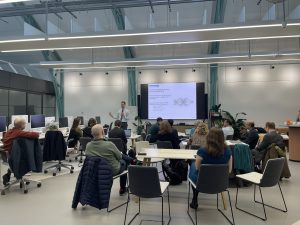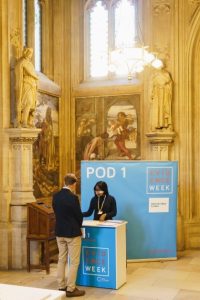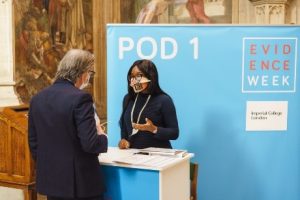An interview with Raffaele Della Croce, Co-Director of the Singapore Green Finance Centre and Advanced Research Fellow at the Centre for Climate Finance and Investment – Imperial College Business School
On 7th January 2025, the first day of Southern California’s devastating wildfires, a Los Angeles-based real estate investor took to X. ‘Does anyone have access to private firefighters to protect our home in Pacific Palisades?’ he asked his thousands of followers; ‘Need to act fast here. All neighbors houses burning. Will pay any amount.’
He wasn’t the only one willing to pay. As the LAFD struggled to cope with the rapidly multiplying blazes and crews from neighbouring states rushed to help them, insurers dispatched scores of private fire brigades to the aid of California’s wealthiest homes and businesses. For Raffaele Della Croce, Advanced Research Fellow at the Centre for Climate Finance and Investment, it was ‘appalling’ but not surprising. ‘Where is this going to lead us?’ he asks, after the 14 fires were finally distinguished. As the effects of the climate crisis become more acute and more widespread, ‘people with money will be able to preserve their own wealth’. ‘Those without means’, meanwhile, ‘will be the first impacted and the least able to act.’
Still, not even the priciest private fire brigades were a match for the scale of the California wildfires, which killed 29 people and destroyed 18,000 homes over the course of three weeks, including mansions worth tens of millions of dollars. Raffaele hopes it will be a ‘brutal wake-up call’ about the urgency of climate adaptation measures in vulnerable cities like LA and London. When extreme weather events hit, people are willing to ‘pay any amount’. But to be blunt, by the time the fire’s burning, it’s already too late.
We need to be willing to pay for ways ‘to endure these extreme events’ at the same time as reducing our carbon emissions, says Raffaele. Our ‘main attention’ has, until now, been on the latter, ‘for good reasons’. But the potential costs of climate-induced extreme events to our global cities’ economies and infrastructures threatens not only our lives, our livelihoods and our basic social contracts, but also the progress we’re making on decarbonisation. The world’s transition to a green economy must be fast and it must be resilient. High-GDP cities like New York, Tokyo, LA, Paris and London will be major engines of that transition. But they are also among climate change’s most vulnerable targets. We cannot afford to lose them to wildfires, floods, droughts, heatwaves or storms.
Raffaele points out that none of this is news. The increasing likelihood of extreme weather events is ‘something scientists have for a very long time been talking about.’ But that conversation ‘has not been translated into action.’ Raffaele is devoting his career to trying to change that. An economist by trade, he has worked at the OECD on the nexus between finance and the real economy. He launched the “Institutional Investors and Long-Term Investment” project, for instance, to explore how the largest pension funds, insurance companies, and sovereign wealth funds worldwide can invest more in infrastructure. In his native Italy, Raffaele was a cabinet member and special adviser to Mario Draghi’s Minister for Infrastructure and Sustainable Transport, coordinating the national plan for resilience and adaptation after Covid-19.
Throughout his career, his doctorate, and now in his work at Imperial, Raffaele’s focus has always been on the ‘practical implementation’ of academic research. Working for the Italian government showed him ‘firsthand’ the ‘reasons why things are not working [and] things do not happen’. Financing and implementing climate adaptation will take a coordinated effort from the public and private sector. But the ‘private-sector point of view’, says Raffaele, is often that it’s the responsibility of the state ‘to bail people out.’ On the other side, there is often mistrust of private capital.

But this public-financed approach is not working, as Raffaele’s recent report ‘Financing Adaptation and Resilience in London and the UK: Moving from Aspiration to Reality’ reveals. Despite being the green finance hub of the UK and Europe, London’s adaptation financing approach is predominantly based on public finance, and particularly the Environment Agency and London municipalities. Despite recent progress, London still lags behind other cities in its adaptation and financing effort. The UK’s Climate Change Committee suggests that £10 billion more will need to be spent yearly to make the UK climate-ready. These sums cannot be raised without involving private capital partners in financing adaptation infrastructure.
The trick, says Raffaele, is to reframe climate adaptation as an attractive investment opportunity as opposed to a costly and inconvenient necessity. For governments, this means showing them how they can reduce costs by avoiding disaster damages and increase revenues from ‘transformed industries’ geared towards ‘the economy we need in the future’. For the private sector, it means highlighting the huge commercial opportunities that climate adaptation presents: from ‘physical infrastructure like dams’ to ‘technological development’ like early warning systems based on big data and the use of artificial intelligence.
That’s what Raffaele’s work at Imperial is doing: reframing climate adaptation as an opportunity, not a burden. As London positions itself as a global leader in green finance, it has the potential to spearhead the mobilisation of private capital for climate change adaptation. To unlock that potential, the government must draw up policies that both grow the market for climate adaptation solutions and stimulate investment into those solutions, protecting the most vulnerable.
At the Centre for Climate Finance and Investment and in his work with Imperial Policy Forum, Raffaele and his colleagues are drawing up practical solutions for policymakers to use: from new cost-benefit measures to specialised investment vehicles for investors to crowdfunding mechanisms at local level. Ever the advocate of ‘practical implementation’, he’s confident his work here is having a real impact.
‘I think there is recognition now of the gaps and the limits of the way research has been carried out in the past,’ he says. Academia is embracing more ‘non-traditional academics’ like him. Policymakers are listening more to academics. And the private sector is asking what more it can do. The biggest barrier to investment in climate adaptation has always been ‘the acceptability to people of whatever you’re proposing’. And people are finally realising, thinks Raffaele, that ‘there is a common interest here.’ Our neighbours’ houses are burning. It’s time to work together to fund climate adaptation.
 Among them are technical leaders driving technology adoption and data analysis, as well as senior policy and strategy officials tackling some of the country’s most pressing policy challenges.
Among them are technical leaders driving technology adoption and data analysis, as well as senior policy and strategy officials tackling some of the country’s most pressing policy challenges.


